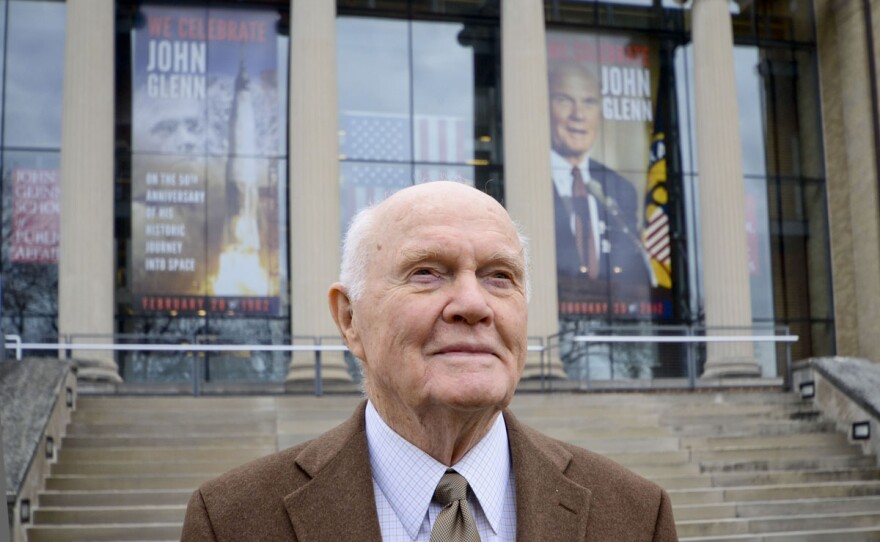John Glenn, the pioneering astronaut and longtime U.S. Senator for the state of Ohio, died Thursday in Columbus. He was 95.
"Godspeed, John Glenn"
Around Ohio, Glenn leaves an easily visible legacy: the John Glenn Columbus International Airport, the Ohio State University's John Glenn School of Public Affairs, the NASA John H. Glenn Research Center in Cleveland, the Senator John Glenn Highway, even John Glenn High School in his hometown of New Concord.
Before all that, though, he left his mark in space.
In 1962, Glenn became the first American astronaut to orbit the Earth. He did it three times, actually, in just five hours. Aboard the Friendship 7 capsule, Glenn reported back to ground control as he left the atmosphere:
"Zero G, and I feel fine. Capsule is turning around. Oh, that view is tremendous."
When President Obama awarded Glenn the Presidential Medal of Freedom in 2012, Obama said in his remarks that "on the morning that John Glenn blasted off into space, America stood still."
"And for half an hour, the phones stopped ringing in Chicago police headquarters, and New York subway drivers offered a play-by-play account over the loudspeakers. President Kennedy interrupted a breakfast with congressional leaders and joined 100 million TV viewers to hear the famous words, 'Godspeed, John Glenn.'"
Leaping Into Service
Born in 1921, a native of New Concord, Ohio, Glenn took his first flight at eight years old - setting him on a long, airborne career path. After the attack on Pearl Harbor, he left Muskingham College to enlist in the Marines and become a fighter pilot, completing over 100 missions in World War II and the Korean War.
In a 2012 tribute on Weekend Edition, Scott Simon said, "John Glenn was a mild-drinking, clean-joking, fair-haired flyboy among fighter jocks, but his fellow pilots hailed him respectfully as Magnet Ass, for all the shrapnel his plane took."
When NASA's Manned Space Program began in 1958, Glenn was selected as one of the original seven astronauts to participate in Project Mercury. On the 50th anniversary of that first orbit, Glenn told NPR's Audie Cornish that the backdrop of the Cold War put extra pressure on his launch - not to mention, the uncertainty of the technology itself.
“(My wife) suggested we ought to take the second ‘A’ out of astronauts. Astronuts, I’ll give it to you anyway," Glenn said, years later.
Though Glenn was denied a second chance to orbit the Earth - he was considered "too valuable" to risk further launches - he would return years later, at 77 years old, to become the oldest astronaut in space.

"The Painstaking March Of Our Democracy"
He left the Marine Corps. to work for Royal Crown Cola, before pursuing a life in politics - spurred on by a suggestion from Bobby Kennedy, whose presidential campaign he joined in 1968.
In 1974, Glenn ran and won election to the U.S. Senate, serving as Ohio's Senator for four consecutive terms - the first ever to do so. Over his 24 years serving as a Democrat, according to an Ohio State biography, "he cast more than 9,400 votes on a host of issues, including education, environment, health, the elderly, civil rights, military readiness, regulatory reform, limiting the expansion of nuclear weapons and increasing scientific research."
“Each had contributed in small or large measure to the painstaking march of our democracy,” Glenn wrote in his 2000 memoir.
His second term in 1980 was won with the largest margin ever recorded in an Ohio election. So he started looking at a presidential bid, which he formally announced in 1983 - eventually losing the Democratic nomination to Walter Mondale.
Thinking Forward And Upward
After he ended his Senate career in 1999, Glenn chose to donate his artifacts to Ohio State University, which opened what became the John Glenn College of Public Affairs. There, archives contain 2,000 cubic feet of documents related to his family and his careers.
As the American space program changed and shrunk, Glenn spoke about the need for continued investment in research and exploration. He hoped to inspire new generations of astronauts and scientists to not just look back at history, but think about the future, and never stop looking upward.
"I still love to fly," Glenn said in 2012, then 90 years old. "And I'll never get over that."

Watch excerpts from WOSU TV's 2013 documentary, John Glenn: A Life of Service.







